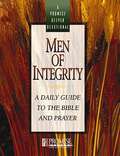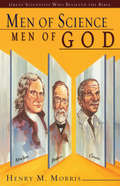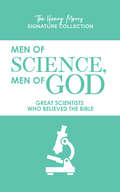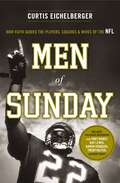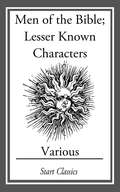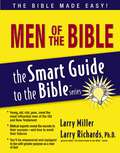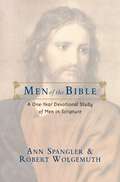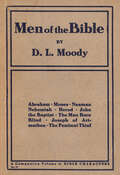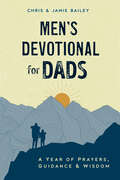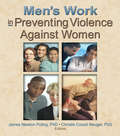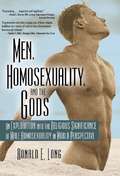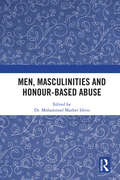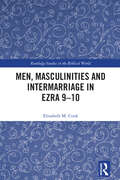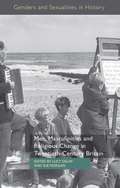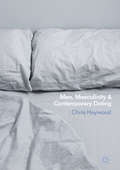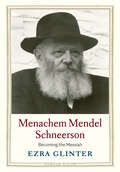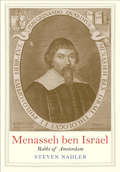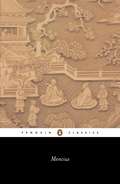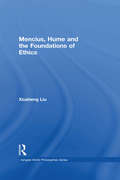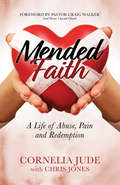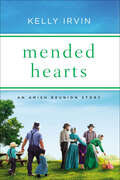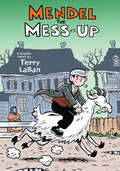- Table View
- List View
Men of Integrity: A Daily Guide to the Bible and Prayer
by Men Of IntegrityDrawing on the themes of the Promise Keepers movement, this daily devotional guide brings compelling stories, timely quotes, practical help, and personal challenges together in an easy-to-read, easy to apply format. Weekly themes include: honoring Christ, sexual purity, meaningful work, handling anger, making wise decisions, self-discipline, and much more. The devotionals are drawn from diverse sources and feature such names as Billy Graham, Gary Smalley, John Trent, Luis Palau, Stuart Briscoe, Phillip Yancey, C.S. Lewis-along with hundreds of other writers and pastors, athletes and administrators, businessmen and entrepreneurs, and anonymous Promise Keepers from every possible walk of life.
Men of Science Men of God
by Dr Henry M. MorrisOne of the most serious fallacies today is the belief that genuine scientists cannot believe the Bible. THE TRUTH IS that many of the major scientific contributions were made by scientists who were dedicated men of God. In Men of Science, Men of God, Dr. Henry Morris presents 101 biographies which include Christian testimonies of scientists who believed in the Bible and in a personal Creator God . . . scientists who were pioneers and "founding fathers" of modern scientific disciplines. "This is a must for every Christian library, and should be required reading for students." - Baptist Bulletin Dr. Henry M. Morris is the father of modern Creation science, the founder of Institute for Creation Research (ICR) and the author of many well-known apologetic books. His thriving legacy continues to equip Christians to be able to defend the accuracy and authority of Scripture today.
Men of Science, Men of God: Great Scientists Who Believed the Bible (The Henry Morris Signature Collection)
by Henry MorrisScientists choose whether they will believer God's word or discount it. Explore over 101 biographies of groundbreaking, influential scientists with their Christian testimonies See how the belief in a Creator inspired the earliest explorations of science and still impacts the work of Bible-believing scientists todayScience and faith are often considered incompatible in the academic world today. One is seen as representing truth, while the other is viewed as fanciful according to the skeptical, science-centered culture. But the reality is that thousands of scientists, in fact, many of science’s greatest “founding fathers,” believed openly in God as they worked and studied His created world. Learn how their discoveries led them to even greater depths of faith and how their beliefs influenced and inspired their work.There is nothing in science that can ever prove that God does not exist and, therefore, no way that science can disprove Creation. For so many in the past, the answer was that their faith was inseparable from their science, a powerful point to encourage believers and challenge the skeptics.
Men of Sunday: How Faith Guides the Players, Coaches, and Wives of the NFL
by Curtis EichelbergerStep into the locker rooms and living rooms of NFL players and their families to see how a close relationship with God guides football's biggest stars.In a behind-the-scenes, off-the-field glimpse into one of America's most beloved sports, Men of Sunday reveals how Sunday's greatest rely on God to face issues such as drug abuse, family crisis, injuries, and temptations resulting from fame and fortune.Compiled from dozens of interviews, Men of Sunday marks the intersection of two Sunday traditions: faith and football. Inspired by the league's "systemic shift" toward embracing Christianity, Bloomberg writer Curtis Eichelberger shows how God is a source of comfort when facing the unique challenges of life in the NFL and the everyday challenges of maintaining strong families and building character.Featured personalities include Baltimore Ravens linebacker Ray LewisNew York Jets running back LaDainian TomlinsonGreen Bay Packers quarterback Aaron RodgersFormer Chicago Bears middle linebacker Mike SingletaryCincinnati Bengals coach Marvin LewisFormer Indianapolis Colts coach Tony DungySan Diego Chargers pastor Shawn MitchellDanisha Rolle, wife of former Tennessee and Baltimore defensive back Samari RolleAnd many moreMen of Sunday is a must-have for any football fan, teaching the invaluable lesson of trusting in the Lord--both on and off the field.
Men of the Bible
by VariousThese are the stories of the lesser-known men of the Bible published in 1904 and written by George Milligan, D.D. J. G. Greenhough, M.A. Alfred Rowland, D.D., LL.B. Principal Walter F. Adeney, D.D. J. Morgan Gibbon. H. Elvet Lewis. Principal D. Rowlands, B.A. W J. Townshed, D.D.
Men of the Bible (The Smart Guide to the Bible Series)
by Larry MillerBe Mentored by the Most Powerful Men of the BibleGod had a purpose for each man in the Bible-and He has a purpose for you. The Smart Guide to the Bible: Men of the Bible leads you to a more intimate relationship with the God of Abraham, Isaac and Jacob, of Paul, Peter, and, of course, Jesus, who was Very God and Very Man.Through the struggles and temptations of these and others, you'll discover the blessings and strength of being a man of God today.Be Smart About:Jesus, Very God & Very ManMen of StrengthMen of HumilityMen after God's Own HeartMen of FaithMen Who Were RestoredMen of DestinyAnd More!
Men of the Bible: A One-Year Devotional Study of Men in Scripture
by Ann Spangler Robert WolgemuthMen of the Bible takes a close-up look at fifty-two men in Scripture—complex flesh-and-blood characters whose strengths and weaknesses often seem strangely similar to our own. Heroes and villains, sinners and prophets, commoners and kings . . . their dramatic life stories provide us with fresh perspective on the unfolding story of redemption. Though our culture differs vastly from theirs, the fundamental issues we face in relation to God and the world remain the same. We still reach for great dreams and selfish ambitions. We wrestle with fear and indecision, struggle with sexual temptation, and experience the ache of loneliness and the devastation of betrayal. And, like many of these men, we long to walk more closely with the God who calls us into an intimate relationship with himself and who enables us to fulfill his purpose for our lives. Men of the Bible offers men and women today a unique devotional experience that combines five elements. Each week becomes a personal retreat focused on the life of a particular man: Monday: His Story—a narrative retelling of the biblical story Tuesday: A Look at the Man—focusing on the heart of the man and how his story connects with your own life Wednesday: His Legacy in Scripture—a Bible study on principles revealed through the life of the man Thursday: His Legacy of Promise—Bible promises that apply to his life and yours Friday: His Legacy of Prayer—praying in light of his story Designed for personal prayer and study or for use in small groups, Men of the Bible will help you make Bible reading a daily habit. Whether you dip into portions or read every page, this book will help you grow in character, wisdom, and obedience as a person after God’s own heart.
Men of the Bible: Abraham, Moses, Naaman, Nehemiah, Herod, John the Baptist, The Man Born Blind, Joseph of Arimathea, The Penitent Thief (Colportage Library #71)
by Dwight L. MoodyIn this classic book written just before the turn of the century, Moody details the lives of Abraham, Moses, Naaman, Nehemiah, Herod, John the Baptist, the man born blind, Joseph of Arimathea, and the penitent thief. He tells each man's story in a way that connects their lives with ours. See how God uses people for His glory and our good!
Men of the Bible: Abraham, Moses, Naaman, Nehemiah, Herod, John the Baptist, The Man Born Blind, Joseph of Arimathea, The Penitent Thief (Colportage Library #71)
by Dwight L. MoodyIn this classic book written just before the turn of the century, Moody details the lives of Abraham, Moses, Naaman, Nehemiah, Herod, John the Baptist, the man born blind, Joseph of Arimathea, and the penitent thief. He tells each man's story in a way that connects their lives with ours. See how God uses people for His glory and our good!
Men's Devotional for Dads: A Year of Prayers, Guidance, and Wisdom
by Chris Bailey Jamie BaileyAn accessible and easy-to-use men's devotional offering a year of scripture, prayers and wisdom. As a main supporter of their families, dads are pillars of strength. But sometimes they can get overwhelmed and stressed and require self-care. Men&’s Devotional for Dads by authors and renowned Christian counselors Chris and Jamie Bailey, helps all dads lean on God for strength and wisdom for the journey of fatherhood and beyond. Men&’s Devotional for Dads features: · 52 WEEKS OF PRAYERS AND DEVOTIONALS: A selection of powerful scripture and God&’s truths makes sure that dad is spiritually covered for the whole year. Anecdotes and cases of real dads provide guidance on refocusing on God. Each devotional offers a prayer for God&’s strength, wisdom, and healing for all seasons of fatherhood. · UPLIFTING AND INSPIRATIONAL AFFIRMATIONS: Each devotional starts with an affirmation that also serves as the devotional theme that reflects God&’s truth · PROFESSIONAL CHRISTIAN COUNSELORS: Chris and Jamie Bailey have been married for more than 27 years and are renowned in their community for helping Christian marriages thrive. Their clients include fathers, and they have helped many dads find their best selves through the grace of God. They both have their Master&’s in Professional Counseling.
Men's Work in Preventing Violence Against Women
by Christie Cozad Neuger James Newton PolingPromote effective partnerships between men and women to end domestic violence! Men's Work in Preventing Violence Against Women examines the experiences of 12 practicing counselors who call on their religious training to form partnerships between men and women that promote an end to domestic violence. In both religious and secular settings, the bulk of the work done to end violence against women is done by women-survivors who have become activists and advocates who have been touched by the witness of survivors. Motivating and educating men to share the everyday work of domestic violence shelters, rape crisis counseling, and abuse prevention is essential. This book challenges traditional images of masculinity, exploring effective-and ineffective-methods of helping men face their own sexism and change their behavior toward the goal of ending domestic violence. Each contributor to Men's Work in Preventing Violence Against Women approached the concept of man/woman partnerships working to end domestic violence and sexual assault with the following questions in mind: In your experience and social world have you seen creative partnerships between men and women that made a difference? Have you seen men in counseling struggle to change their views on gender in order to become reliable allies in the fight to end violence against women? How can religion become a resource for men working to become allies with women? What strategies can men use to help end violence against women? Men's Work in Preventing Violence Against Women includes contributions from Paul Kivel, cofounder of the Oakland Men's Project and of Gvarim: Bay Area Jewish Men Against Violence; David Livingston, author of Healing Violent Men: A Model for Christian Communities; Al Miles, author of Domestic Violence: What Every Pastor Should Know; and Richard Wallace Jr., editor of the Journal of Ministry in Addiction & Recovery (Haworth). Each essay presents practical and theoretical ideas, guidelines for partnerships, and insightful information on sexual and domestic violence. Topics addressed include: Jewish male violence holding Christian men accountable for domestic violence shared experiences of batterers and the people who treat them premarital preparation the dynamics of power in pastoral care engaging Scripture with male abusers helping men become pro-feminist Men's Work in Preventing Violence Against Women is an essential resource for counselors, social workers, clergy, laypersons, and anyone else working to end domestic violence and sexual abuse against women.
Men, Homosexuality, and the Gods: An Exploration into the Religious Significance of Male Homosexuality in World Perspective
by Ronald LongCompare worldwide religious regulations involving gay sex and masculinity! Men, Homosexuality, and the Gods: An Exploration into the Religious Significance of Male Homosexuality in World Perspective is an eye-opening look at the traditions of particular religions and their edicts concerning gay sex. This book examines the origins of holy directives involving homosexuality-whether forbidden, tolerated, or mandatory-and establishes a link between theology, sex roles, and the sensitive issue of masculinity. This text draws a parallel between homosexuality and the idea of religion, suggesting that gay rights can be understood as a freedom of religion issue. While most readers are familiar with the traditional Islamic, Christian, and Hebrew prohibitions against sex between two males, this book also reveals other historic religions from around the world that neither opposed nor looked down on homosexuality. Men, Homosexuality, and the Gods argues that masculinity is the universal theme that formed historical interpretation-warriors and men of high status could not be sexually receptive or "feminine" and still be called "men." This intriguing text shows how the modern homophile movements are in effect redefining masculinity to obliterate the stigma of being a sexually receptive man. Men, Homosexuality, and the Gods examines the significance of homosexuality in such religions as: the Sambians of New Guinea the Taoists of Ancient China Plato and the later Stoics Islamic Sufism Native American culture Hebrew Scriptures early Christianity Buddhism Men, Homosexuality, and the Gods is an enlightening book that honors homosexual claims to moral integrity and appreciates religion and religious figures without rancor. Easy-to-read and free of technical language, this volume is for anyone who has an academic, professional, or personal interest in theology and homosexuality. The author is available for speaking engagements and can be contacted at Ronldlong@aol.com
Men, Masculinities and Honour-Based Abuse
by Mohammad Mazher IdrissThis book explores the largely neglected relationship between men, masculinities and honour-based abuse (HBA). There is a common misconception that HBA – whether physical violence, emotional abuse or so-called ‘honour’ killings – occurs only against women. This book addresses the gap in the current literature concerning the relationship between men, masculinities and HBA. With contributions from an international and interdisciplinary range of both academics and professionals, the book examines HBA and forced marriages specifically from male-victim perspectives, both in the UK and internationally. Providing a clear understanding of the main theoretical and sociological explanations of HBA against male victims, the book demonstrates that, although men are indeed the main perpetrators of HBA, state agencies must address the fact that many men are also victims. This book is essential reading for students, academics, and practitioners alike.
Men, Masculinities and Intermarriage in Ezra 9-10 (Routledge Studies in the Biblical World)
by Elisabeth M. CookOffering a reading of the intermarriage debate and expulsion of the foreign women in Ezra 9-10, this book engages with the production and performance of masculinities in this biblical text, shifting the focus away from the 'foreign women' to the men who are the primary actors in this work. This approach addresses the diversity of masculinities and the ways in which they are implicated in the production of power relations in the text. It explores the ‘feminized’ masculinity of the peoples-of-the-lands, the unstable masculinity of the golah, Ezra’s performance of penitential masculinity, and the rehabilitation of divine masculinity. The rejection of the marriages and the call for the expulsion of the women and children are addressed as sites on which masculinities and power relations are configured. In doing so, this book sheds light on how women and the traits and performances culturally ascribed to women, femininity and inferior masculinities, are appropriated to produce masculinities and negotiate power relations between men. It posits that the debate in Ezra 9-10 is not, ultimately, about the women themselves, but about bringing the masculinities, bodies and practices of dissenting men under the ‘management’ of those who wield the Torah in the narrative world of the text. Men, Masculinities and Intermarriage in Ezra-9-10 is of interest for scholars and students working on the Book of Ezra specifically, as well as the Hebrew Bible and its world more broadly. It is also a valuable study for those working on masculinities and gender in the biblical world and ancient Near East.
Men, Masculinities and Religious Change in Twentieth-Century Britain
by Sue Morgan Lucy DelapCharting the growing religious pluralism of British society, this book investigates the diverse formations of masculinity within and across specific religions, regions and immigrant communities. Contributors look beyond conventional realms of worship to examine men's diverse religious cultures in a variety of contexts.
Men, Masculinity and Contemporary Dating
by Chris HaywoodAt a time when traditional dating practices are being replaced with new ways to meet potential partners, this book provides fresh insights into how are men responding to new ways of dating. Drawing upon original research, this book examines a wide range of contemporary dating practices that includes speed dating, holiday romances, use of dating apps, online sex seeking and dogging. It reveals the ways in which men draw upon traditional models of masculinity to negotiate these changes; but also, the extent to which men are responding by elaborating new masculinities. Through an investigation of the dynamics of heterosexuality and masculinity, this book highlights the importance attached to authenticity, and the increasing marketization and commodification of dating. It argues that in a post-truth world, men must also come to terms with a post-trust dating landscape. Combining rich empirical material with keen theoretical analysis, this innovative work will have interdisciplinary appeal for students and scholars of sociology, media studies, cultural studies, and gender studies.
Menachem Mendel Schneerson: Becoming the Messiah (Jewish Lives)
by Ezra GlinterThe life and thought of Menachem Mendel Schneerson, one of the most influential—and controversial—rabbis in modern Judaism &“Accessible, informed, and balanced. . . . The author manages to tread on fragile ground with aplomb. . . . An exceptional tool for understanding.&”—Kirkus Reviews (starred review) The Chabad-Lubavitch movement, one of the world&’s best-known Hasidic groups, is driven by the belief that we are on the verge of the messianic age. The man most recognized for the movement&’s success is the seventh and last Lubavitcher rebbe, Menachem Mendel Schneerson (1902–1994), believed by many of his followers to be the Messiah. While hope of redemption has sustained the Jewish people through exile and persecution, it has also upended Jewish society with its apocalyptic and anarchic tendencies. So it is not surprising that Schneerson&’s messianic fervor made him one of the most controversial rabbinic leaders of the twentieth century. How did he go from being an ordinary rabbi&’s son in the Russian Empire to achieving status as a mystical sage? How did he revitalize a centuries-old Hasidic movement, construct an outreach empire of unprecedented scope, and earn the admiration and condemnation of political, communal, and religious leaders in America and abroad? Ezra Glinter&’s deeply researched account is the first biography of Schneerson to combine a nonpartisan view of his life, work, and impact with an insider&’s understanding of the ideology that drove him and that continues to inspire the Chabad-Lubavitch movement today.
Menasseh ben Israel: Rabbi of Amsterdam (Jewish Lives)
by Steven NadlerAn illuminating biography of the great Amsterdam rabbi and celebrated popularizer of Judaism in the seventeenth century Menasseh ben Israel (1604–1657) was among the most accomplished and cosmopolitan rabbis of his time, and a pivotal intellectual figure in early modern Jewish history. He was one of the three rabbis of the “Portuguese Nation” in Amsterdam, a community that quickly earned renown worldwide for its mercantile and scholarly vitality. Born in Lisbon, Menasseh and his family were forcibly converted to Catholicism but suspected of insincerity in their new faith. To avoid the horrors of the Inquisition, they fled first to southwestern France, and then to Amsterdam, where they finally settled. Menasseh played an important role during the formative decades of one of the most vital Jewish communities of early modern Europe, and was influential through his extraordinary work as a printer and his efforts on behalf of the readmission of Jews to England. In this lively biography, Steven Nadler provides a fresh perspective on this seminal figure.
Mencius
by Mencius D. C. LauMencius helped formulate a Confucian orthodoxy that helped China replace feudalism with a centralized government around 320 BC. This is part of the Four Books that make up the Confucian corpus.
Mencius
by MenciusMencius was one of the great philosophers of ancient China, second only in influence to Confucius, whose teachings he defended and expanded. The Mencius, in which he recounts his dialogues with kings, dukes and military men, as well as other philosophers, is one of the Four Books that make up the essential Confucian corpus. It takes up Confucius's theories of jen, or goodness and yi, righteousness, explaining that the individual can achieve harmony with mankind and the universe by perfecting his innate moral nature and acting with benevolence and justice. Mencius' strikingly modern views on the duties of subjects and their rulers or the evils of war, created a Confucian orthodoxy that has remained intact since the third century BCE.
Mencius, Hume and the Foundations of Ethics (Ashgate World Philosophies Series)
by Xiusheng LiuWhat is the most distinctive feature of human nature? Does human nature play any significant role in explaining ethical objectivity? How do we arrive at moral judgments? What is the relationship between moral judgments and moral motivation? In answering these questions, this book defends a naturalist, realist and internalist theory of the foundations of ethics. This theory, grounded on a particular concept of humanity, combines insights from Mencius and David Hume. The views of each show how important features left underdeveloped by the other can be supplemented and refined. The unified theory that results is a robust contender among current ethical theories. This illuminating book, relating Chinese and Western philosophical traditions, presents a unique account of the unity of the virtues in Mencius, breaks new ground in Hume studies through its discussion of the concept of sympathy in Hume's theory, and brings combined insights to bear on contemporary analytical theories of ethics.
Mended Faith: A Life of Abuse, Pain and Redemption
by Chris Jones Cornelia JudeMended Faith shares Cornelia Jude&’s struggle to understand why she was the target of repetitive sexual, physical, and emotional abuse, and how unhealthy coping mechanisms—drug and alcohol abuse, reclusive behavior, and self-mutilation—didn&’t heal her, but added more brokenness to her already shattered life. Her story mirrors the accounts of many women today living in the shadows of their abuse and who watch its remnants affect their marriages, damage their parenting, and cloud their judgment. Jude builds a case for faith in Christ as the only way to find peace, forgive abusers, and live a life of joy beyond the shadows of pain.
Mended Hearts: An Amish Reunion Story (Amish Reunion Stories)
by Kelly IrvinAt eighteen Hannah Kauffman made a terrible mistake. Her parents and members of her Jamesport Amish community say they&’ve forgiven her. But she feels their eyes following her everywhere she goes with eighteen-month-old Evie. Thaddeus, Evie&’s father, escaped this fate by running away from Jamesport. Now that Thaddeus is gone, Hannah&’s old friend Phillip is stepping up to be by her side. He has waited patiently for Hannah to realize just how much he cares for her. But when Thaddeus returns after two years, Hannah can&’t deny the love she feels for him. Does the fact that Phillip has waited patiently for her all this time mean that she owes him something? Can she trust either one of them? Can she trust herself? She has repented and been forgiven by the One who is most important—her heavenly Father. But is she willing to risk making more mistakes by opening herself up to love?
Mendel the Mess-Up
by Terry LaBanCursed from birth, Mendel Schlotz is the unluckiest kid in his village.He&’s also the only one who can save it.Ask anyone—twelve-year-old Mendel can&’t do anything right. When he tries to herd goats, they get out. When he tries to chop wood, he breaks the ax. It&’s embarrassing to be called &“Mendel the Mess Up,&” but it&’s worse to be so clumsy that he can&’t even stand to read aloud without destroying the classroom. Nobody expects Mendel to keep out of trouble… least of all himself.But when the Cossacks invade Mendel&’s remote Jewish village of Lintvint (famous for Lintvint kvatch, which is made from a very special ingredient), Mendel&’s not the only one in trouble. When he slips away from the mountain caves where his fellow villagers are hiding, out of certainty he&’ll find a way to make things worse if he&’s around them, he discovers an unexpected opportunity to save the day. Mendel&’s always been different because everything he does turns into disaster. Now, he&’s the only one who can help the people who doubt him.Could Mendel&’s bad luck be the key to saving Lintvint? Or will his plan to drive the Cossacks off go as badly as everyone—including him—expects?Sympathetic, funny, and warm, this fast-paced middle-grade graphic novel from a veteran Jewish comics star reminds young readers who feel just a little out of place in their world that sometimes our weaknesses can be our greatest strengths.
Mending
by Dorothy HsuMENDING is a diary of one widow's thoughts and emotions ... of the questions she asked and the answers she found ... of a faith that helped her accept a new life ... without fear ... without shame ... or bitterness.
